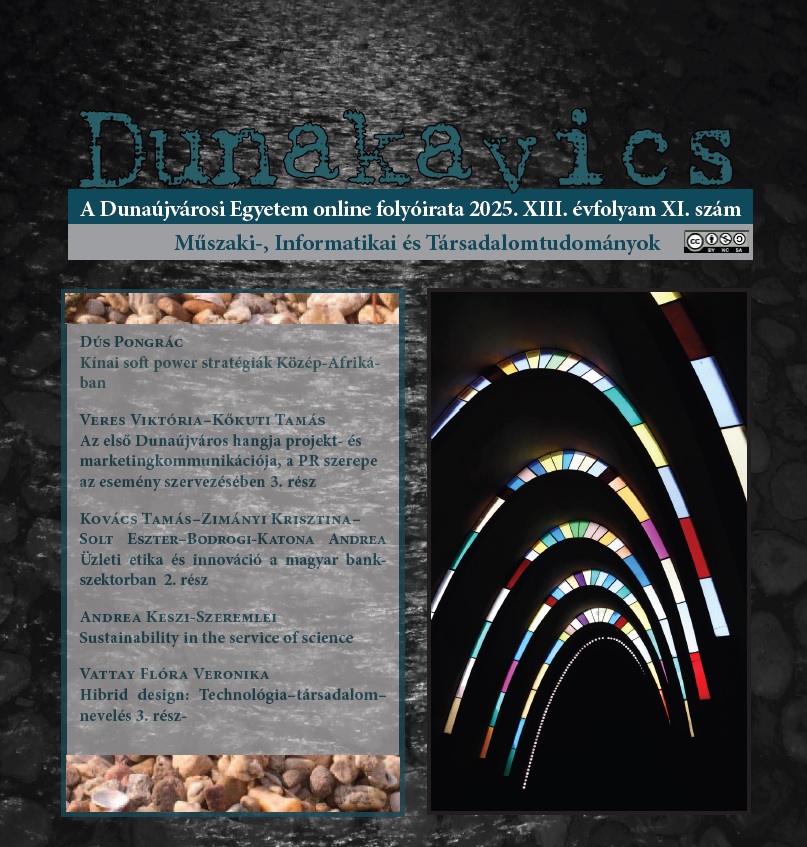Sustainability in the service of science
Absztrakt
Researchers have been predicting the occurrence, increase in number, and intensification of environmental disasters caused by global warming for years. The leaders of individual countries are gradually becoming aware of this reality. Others have already set out on a path that will transform their countries into more environmentally friendly modes of operation. In order to achieve these goals, target values have been set at both the global and national levels, which, if met, will allow us to avoid or at least slow down the adverse changes predicted by researchers.
One of the main causes of global warming is the continuous increase in the carbon dioxide content of the air, for which road transport, and in particular the use of passenger cars, is largely responsible. Transportation using electric vehicles, i.e., electromobility, is one possible solution for replacing vehicles that run on fossil fuels. The popularity of these vehicles has been growing in recent years. The number of electric cars on the world's roads rose from nearly 1 million in 2016 to nearly 14 million by the end of 2023. The popularity of electric cars can be attributed to global reasons as well as economic ones.
Electric cars are also becoming increasingly popular in Hungary, with the number of green license plate cars steadily rising, but there are still few purely electric vehicles on Hungarian roads, as the population is not yet willing to take the risks associated with electric cars. The primary objective of the study is to outline, based on perceptions of electric cars, how the population's awareness could be increased, taking into account various possibilities.
Hivatkozások
Gröger, O.–Gasteiger, H. A.–Suchsland, J. P. (2015): Review – Electromobility: Batteries or Fuel Cells? Journal of The Electrochemical Society, 162., (14.).
Korkut, H.–Falus, O. (2022): “Smart city” – Challenges and Opportunities in Turkey and in Hungary. In: Balázs et al. (Szerk.): Elektromobilitás és társadalom. Dunaújváros: DUEPress, pp. 109–124.
Sitku K. (2022): Az elektromos közlekedés társadalmi hatásai. In: Balázs et al. (Szerk): Elektromobilitás és társadalom. Dunaújváros: DUE Press, pp. 11–25.
Eardley, C. (2022): Electric Mobility: Inevitable, or Not? Final report, 43., Available online: https://bit.ly/3qhneEv, Download: 2022. 08. 26. [5] Saleh, M. A. S. (2024): The Future Trend of E-Mobility in Terms of Battery Electric Vehicles and Their Impact on Climate Change: A Case Study Applied in Hungary. American Journal of Climate Change, 13., pp. 83–102. https://doi.org/10.4236/ajcc.2024.132006
Kovács Sz. (2022): Dunaújváros térség kialakuló elektromobilitási ökoszisztémájáról. In: Balázs László– Rajcsányi-Molnár Mónika–András István (Szerk.): Elektromobilitás és társadalom. Dunaújváros: DUE Press, pp. 27–52.
Borbáth P. (2022): Mitől lesz fenntartható a közlekedés? Mi a helyzet Budapesten? Életmód, Klímaszótár. https://xforest.hu/fenntarthato-kozleke- des/
Pintér T.–Szabó L.–Sitku K. (2024): Városi mikromobilitás. Fiatal generációk e-roller használata egy magyarországi vidéki városban. Dunakavics, 12., (7.), pp. 45–60.
Falus O.–Dósáné Pap Gy. (2024): Az innováció jogi védelme: Példák az elektromobilitás köréből. In: Falus Orsolya–Németh István Péter (Szerk.): Innovációs terek. Dunaújváros: DUE Press, pp. 135–143.
Kőkuti T. (2022): Mesterséges intelligencia és elektromobilitás. In: Balázs László–Rajcsányi-Molnár Mónika–András István (Szerk.): Elektromobilitás és társadalom. Dunaújváros: DUE Press, pp. 69–82.
Sitku K. (2022): Az elektromos közlekedés társadalmi hatásai. In: Balázs et al. (Szerk): Elektromobilitás és társadalom. Dunaújváros: DUE Press, pp. 11–25.
Pintér T.–Szabó L.–Sitku K. (2024): Városi mikromobilitás. Fiatal generációk e-roller használata egy magyarországi vidéki városban. Dunakavics, 12., (7.), pp. 45–60.
Fejes Cs.–Kovács Sz. (2022): Az elektromobilitás és az energiatudatos szemlélet terjedésének társadalmi és gazdasági kihívásai. In: Balázs László–Rajcsányi-Molnár Mónika–András István (Szerk.): Elektromobilitás és társadalom. Dunaújváros: DUE Press, pp. 83–106.
Reibnitz, U. (1992): Szenario-Technik. Instrumente für die unternehmerische und persönliche Erfolgsplanung. 2. Auflage, Wiesbaden: Gabler Verlag.
Schuh, G.–Stich, V.–Ansorge, B. (2013): Smart Wheels: mobil im Internet der Energie. Aachen: FIR e.V. an der RWTH Aachen. (Edition Forschung, 10)
Mißler-Behr, M.: Methoden der Szenarioanalyse. Wiesbaden, s.l.: Deutscher Universitätsverlag. (DUV Wirtschaftswissenschaft), http://dx.doi.org/10.1007/978-3-663-14585-1. Accessed on: 10 Aug. 2017.
Kolz, D.–Schwartz, M. (2017): Key Factors for the development of Electro-Mobility, Energy and Sustainability. WIT Transactions on Ecology and The Environment, 224., Wittpress.com.
Mersky, A. C.–Sprei F.–Samaras, C.–Qian, Z. S. (2016): Effectiveness of incentives on electric vehicle adoption in Norway. Transportation Research Part D: Transport and Environment, 46., pp. 56–68.
Orfanou, F.–Papantoniou, P.–Vlahogianni, E.–Yannis, G. A (2021): Comparative Gap Analysis for Electromobility and Alternative Fuels. Adv. Intell. Syst. Comput. 1278., pp. 606–615.
Coffman, M.–Bernstein, P.–Wee, S. (2017): Electric vehicles revisited: A review of factors that affect adoption. Transp. Rev. 37., pp. 79–93.
Zhang, Y.–Yu, Y.–Zou, B.: Analyzing public awareness and acceptance of alternative fuel vehicles in China: The case of EV. Energy Policy, 39., (11.), pp. 7015–7024.
Thiel C.–Alemanno A.–Scarcella G.–Zubaryeva A.–Pasaoglu G. (2012): Attitude of European car drivers towards electric vehicles: a survey. JRC report.
Pintér T.–Szabó L.–Sitku K. (2024): Városi mikromobilitás. Fiatal generációk e-roller használata egy magyarországi vidéki városban. Dunakavics, 12., (7.), pp. 45–60.
Varga A. (2024a): Cselekvő egyetemek– innovatív kezdeményezések– minőségbiztosítás. In: Falus Orsolya–Németh István Péter (Szerk.): Innovációs terek. Dunaújváros: DUE Press, pp. 169–183.
Varga A (2024b): A fenntarthatóság és a társadalmi innováció kapcsolatának néhány jellemzője – a felsőoktatás néhány jó példája. In: Balázs László–Rajcsányi- Molnár Mónika– András István–Keszi- Szeremlei Andrea (Szerk.): Átalakuló közgazdaságtan és fenntarthatóság. Dunaújváros: DUE Press, pp. 7–16.
Kőkuti T. (2015): Hallgatói jövőorientáció mint versenyképes attitűd. In: András István– Rajcsányi-Molnár Mónika–Németh István (Szerk.): Nyelvi terek. Dunaújváros: DUF Press.




